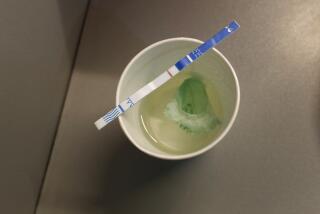Medical testing in your home
- Share via
Twice a year, Mary Shomon officially checks her ever-fluctuating thyroid hormones -- but without bothering to leave her home for a trek to a lab or doctor’s office.
Instead, she pricks her finger with a tiny lancet provided in a thyroid test kit she orders over the Internet. The blood spots onto a small filter strip, which Shomon then mails to a lab. There, it’s analyzed for the levels of thyroid hormones and antibodies. The results are sent directly to her home in Kensington, Md. Shomon shares the results with her doctor, who then adjusts treatment, or not, accordingly.
“I monitor my thyroid condition between doctor’s visits or when I want to get a little more information,” said Shomon, who has written several books on thyroid disease, including the 2004 bestseller “The Thyroid Diet: Manage Your Metabolism for Lasting Weight Loss” after her diagnosis with Hashimoto’s hypothyroidism in 1995. Hashimoto’s disease is an autoimmune condition in which antibodies attack the thyroid gland. “I have a very cooperative doctor who has always been a partner.”
Like Shomon, health-obsessed, time-pressed and cost-conscious Americans are discovering that home-health tests can give them some control over their own health and medical conditions. Some tests are used to monitor existing conditions such as diabetes and high cholesterol; others screen for new problems.
If test results detect no changes or no new conditions, an expensive and time-consuming doctor’s visit can often be avoided. If the tests detect an ailment or change, the results add impetus to the need for care. For the uninsured and, sometimes, even the insured, a test can cost less than a co-pay or a visit to an out-of-network doctor. At $200, Shomon’s thyroid test, which includes lab work, is less expensive than visiting her doctor (who is not a provider on her insurance plan) and paying the subsequent lab fee. The thyroid medications, which Shomon’s doctor tweaks according to the lab readings, are covered by her insurance, however, and become a part of Shomon’s medical records.
That’s not to say testing always saves money. A urinary tract infection kit may cost only about $13.99 at a pharmacy, but if the test is positive, treatment will require a prescription from a doctor. And the doctor will likely want to confirm the diagnosis with another test. Unless the test is negative, that’s hardly a savings if one must pay the test cost, plus a doctor’s visit fee or co-pay.
But the twin benefits of control and empowerment are essential to people who want more nuanced information about their health than perhaps their doctor deems necessary or than their insurance company is willing to fund. Home-health tests allow a consumer to get information without being at the mercy of a physician’s appointment book.
“Home-health tests that are safe and effective allow patients more control over some of their care,” wrote Dr. Diane Rittenhouse, a family and community medicine specialist at UC San Francisco, who responded by e-mail. “A patient who self-diagnoses high cholesterol can change their diet and exercise, share results with their physician or do nothing. Ideally, care occurs in a partnership between patients and physicians.”
Added Dr. Lori Heim, president of the American Academy of Family Physicians: “People are paying for these tests out-of-pocket, so that tells me that there is tremendous market out there.”
--
Growth industry
Analysts for marketing and consulting companies specializing in healthcare estimate that Americans spent about $4.5 billion in 2008 on over-the-counter home health tests, compared with $3 billion in 2005. The annual growth rate is projected at 7% to 8% a year, presumably reaching $5.68 billion by 2013, according to Scientia Advisors, an international consulting firm.
About 85% to 90% of the market is blood glucose and pregnancy testing. But the array of tests now available to consumers is significantly larger. Tests for cholesterol, colon cancer, drug and alcohol abuse, blood glucose, hepatitis C and HIV can be found in pharmacies. And a veritable arsenal of tests is available for sale online, including ones for strep, sexually transmitted diseases, and bowel and prostate cancer.
Just last month, the Los Angeles County Department of Public Health launched a program offering free home-collection test kits for gonorrhea and chlamydia (available online at www.dontthinkknow.org or by calling [800] 758-0880). The program is modeled after a successful outreach program based in Maryland that tests for gonorrhea, chlamydia and trichomonas vaginalis (a sexually transmitted parasite).
Untreated, gonorrhea and chlamydia, the latter of which affects mostly women ages 15 to 24, can cause infertility, pelvic inflammatory disease and dangerous ectopic pregnancies.
Test specimens (a vaginal swab is placed in a specimen bag and mailed postage paid to the Public Health Laboratory) are processed in a week; confidential results are available online or by phone. Women can choose to be notified by e-mail or text message.
Those who test positive are given nearby clinic locations and free or no-cost treatment (both diseases are treated with antibiotics). The department is also offering free counseling by health educators at (800) 758-0880.
“Physicians are very concerned that people won’t seek testing [for sexually transmitted diseases] because of embarrassment and privacy concerns,” Heim said. “At-home tests eliminate those concerns; without such privacy, some patients might never get screened.”
--
Doctor’s input
Treatment, of course, requires a doctor’s guidance, especially if prescription drugs are involved. And doctors say that’s for the best.
“As good as it is for patients to be actively involved in their own healthcare,” Heim said, “it also has a downside if the patient is acting alone without anyone there to guide them or coordinate care.”
It’s worth noting, however, that many physicians also feared the effect of at-home HIV tests. “There was a concern that people would not go and get proper counseling because they would decide [a positive result] was a death sentence,” Heim said. That fear proved unfounded.
In 1996, the FDA approved the first (and to-date only) test for HIV -- the Home Access HIV-1 Test System or the Home Access Express HIV-1 System, which includes post-test counseling. (Beware the many impostor HIV tests illegally marketed online, the FDA warns.) Sometimes, the tests rule out possible infections or diseases. But positive results should be reviewed by a doctor. Physicians view tests results through the prism of family history, individual health history, age, lifestyle habits and other factors detected through a physical exam.
“If the results of a test do not fit a patient’s clinical profile,” Heim said, “then the doctor gives the test again. Sometimes a patient will have something in their blood like antibodies that interfere with the formulations of a test. A physician can see red flags easier than a patient can.”
As for Shomon, home-health tests simply allow her to take charge of her chronic condition so that she and her doctor can fine-tune treatment as stress and hormonal changes affect how well her thyroid functions and how she feels day-to-day.
“Medical test kits put some aspects of the decision process in the hands of the patient instead of the HMO, or the insurance company or the doctor,” Shomon said. “Given the wait lists for doctors appointments and HMOs that sometimes put cost containment above patient interests, there are benefits to patients having these options.”
--
Interested in a test you have seen marketed online? To check its FDA status, go to www.fda.gov, search for “IVD Over-the-Counter Database” and then check for FDA approval. Or call (888) INFO-FDA or (888) 463-6332.






